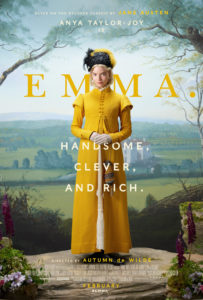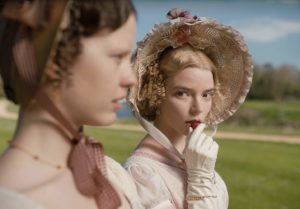Film Review: This Frothy “Emma.” Entertains, If Nothing Else
Written by: Christopher Llewellyn Reed | March 5th, 2020

Emma. (Autumn de Wilde, 2019) 2½ out of 4 stars.
Joyously stylized and often gloriously silly, director Autumn de Wilde’s new version of Jane Austen’s fourth novelis a swirl of color amidst a puff of light dramedy. Though the heft of high narrative stakes may be far from its center of screenplay gravity, the enjoyable mise-en-scène and period setting prove a disarming distraction from the fact that Emmais perhaps one of Austen’s slightest works (if still pleasing). No one truly suffers, all wrongs are righted, and Georgian England returns to its briefly disturbed normality. It may ultimately be forgettable, but it is pleasantly so, a tasty enough cinematic confection to savor and then quickly digest.
Anya Taylor-Joy (The Witch) plays the title character, daughter of a gentleman and most proud to be so. Sure of herself in all things, she takes Harriet (Mia Goth, A Cure for Wellness), a local lady of uncertain, if any, fortune or prospects, under her wing, dissuading her from marriage to a man she clearly loves, but whom Emma deems not important enough for her. And so it goes: though well-intentioned, Emma is a meddler. She’s also charming and pretty, as evidently noticed by her neighbor Mr. Knightley (Johnny Flynn, Beast). In the book, he is her sister’s brother-in-law, though here the relationship is less clear, beyond their proximity and years in each other’s company. No matter, as de Wilde keeps the story clicking along, the questions of who knows who and why, and how status factors into the equation, less important than the general good cheer of the enterprise.

In one particular way, de Wilde – a music-video and short-film director making her feature debut – and first-time script writer Eleanor Catton distinguish themselves and this adaptation, and that is in the occasional humorous depictions of how the working class must view their foppish superiors. In a number of scenes of high anxiety or flowing emotion, they show us servants turning on their heels or walking away, possibly embarrassed, undercutting the tension of the moment with a reminder that there just might be other concerns in this world. I wish they had done more with the device, as otherwise this is just yet another version of Emma; diverting, for sure, but not so different from the 1996 model (with Gwyneth Paltrow) or other variants (including Amy Heckerling’s modern update, Clueless). The period at the end of the title notwithstanding, this can hardly be the definitive word on the subject.
Still, it’s good fun. Taylor-Joy is perfect, combining arrogance, insouciance and a winsome smile into an appealing character more than due for a comeuppance. Goth and Flynn both shine, as well, though it is Bill Nighy (Their Finest), as Emma’s father, who provides the greatest entertainment value (even as he oversells a few sequences). Most of all, though, the production design and attendant costumes steal the show, even if I didn’t quite understand what appears to be (intended or not) a Handmaid’s Tale-like reference where young women walk around in red hoods (certainly Emma, herself, is hardly oppressed, even if she operates within the constraints of her era). Effervescence has its value, even if it dissipates quickly.


